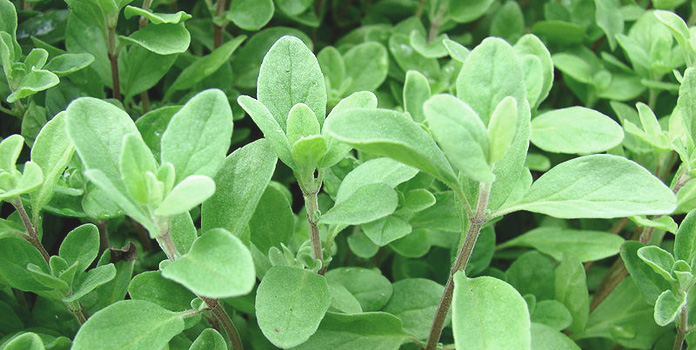Marjoram
- Marjoram is a plant. You probably recognize it as a common cooking spice. But it also has an interesting place in early Greek mythology. As the story goes, the goddess of love, Aphrodite, grew marjoram, and, as a result, marjoram has been used ever since in various love potions.
Contents
Uses
- People make medicine from marjoram’s flowers, leaves, and oil.
- Tea made from the leaves or flowers is used for runny nose and colds in infants and toddlers, dry and irritating coughs, swollen nose and throat, and ear pain.
- Marjoram tea is also used for various digestion problems including poor appetite, liver disease, gallstones, intestinal gas, and stomach cramps.
- Some women use marjoram tea for relieving symptoms of menopause, treating mood swings related to menstrual periods, starting menstruation, and promoting the flow of breast milk.
- Other uses include treating diabetes, sleep problems, muscle spasms, headaches, sprains, bruises and back pain. It is also used as a “nerve tonic” and a “heart tonic,” and to promote better blood circulation.
- Marjoram oil is used for coughs, gall bladder complaints, stomach cramps and digestive disorders, depression, dizziness, migraines, nervous headaches, nerve pain, paralysis, coughs, runny nose; and as a “water pill.”
- In foods, marjoram is a culinary spice. The oil and oleoresin are used as flavor ingredients in foods and beverages.
- In manufacturing, the oil is used as a fragrance in soaps and cosmetics.
Cautions
- Marjoram is LIKELY SAFE in food amounts and POSSIBLY SAFE for most adults when taken by mouth in medicinal amounts for short periods of time.
- Marjoram is POSSIBLY UNSAFE when used long-term or when applied to the eye or skin as fresh marjoram. There is some evidence that marjoram could cause cancer if used long-term. Applying fresh marjoram might cause eye or skin irritation.
- Pregnancy and breast-feeding: It is POSSIBLY UNSAFE to use marjoram in medicinal amounts if you are pregnant. It might start your period, and that could threaten the pregnancy. Not enough is known about the safety of using marjoram in medicinal amounts if you are breast-feeding. Stay on the safe side and avoid use.
- Children: Do not give marjoram to children in medicinal amounts. It is POSSIBLY UNSAFE for them.
- Bleeding disorders: Taking medicinal amounts of marjoram might slow clotting and increase the chances of bruising and bleeding in people with bleeding disorders.
- Slow heart rate (bradycardia): Using medicinal amounts of marjoram might slow down the heart beat. This could be a problem in people who already have a slow heart rate.
- Allergy to basil, hyssop, lavender, mint, oregano, and sage: Marjoram can cause allergic reactions in people allergic to these plants and other members of the Lamiaceae family of plants.
- Diabetes: Marjoram might affect blood sugar levels in people with diabetes when used in medicinal amounts. Watch for signs of low blood sugar (hypoglycemia) and monitor your blood sugar carefully if you have diabetes and use marjoram medicinally.
- Gastrointestinal tract blockage: Marjoram might cause “congestion” in the intestines when used in medicinal amounts. This might cause problems in people who have a blockage in their intestines.
- Ulcers: Marjoram might increase secretions in the stomach and intestines when used in medicinal amounts. There is concern that this could worsen ulcers.
- Lung conditions: Marjoram might increase fluid secretions in the lung when used in medicinal amounts. There is concern that this could worsen lung conditions such as asthma or emphysema.
- Seizures: There is concern that using medicinal amounts of marjoram might increase the risk of seizures.
- Surgery: Taking medicinal amounts of marjoram might increase the risk of bleeding during and after surgery. Stop using marjoram medicinally at least 2 weeks before a scheduled surgery.
- Urinary tract obstruction: Marjoram might increase secretions in the urinary tract when used in medicinal amounts. There is concern that this could worsen urinary obstruction.
Interactions
Moderate Interaction Be cautious with this combination:
- Lithium interacts with MARJORAM: Marjoram might have an effect like a water pill or “diuretic.” Taking marjoram might decrease how well the body gets rid of lithium. This could increase how much lithium is in the body and result in serious side effects. Talk with your healthcare provider before using this product if you are taking lithium. Your lithium dose might need to be changed.
Other Names
- Don’t confuse marjoram with winter marjoram or oregano (Origanum vulgare), which is also referred to as wild marjoram.
Essence de Marjolaine, Garden Marjoram, Gartenmajoran, Huile de Marjolaine, Knotted Marjoram, Majoran, Majorana Aetheroleum Oil, Majorana Herb, Majorana hortensis, Majorana majorana, Marjolaine, Marjolaine des Jardins, Marjolaine Ordinaire, Marjoram Essential Oil, Marjoram Oil, Marubaka, Marwa, Mejorana, Origan des Jardins, Origanum majorana, Sweet Marjoram.
References
Source: WebMD, “Marjoram”, www.webmd.com/vitamins-supplements/

